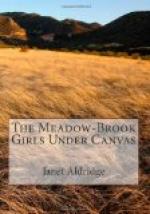“Do you think I could keep a thecret all that time?” answered Grace. “Didn’t I nearly break my prethiouth neck to get down here to tell you the good newth the minute I heard it? Didn’t I get run over by an automobile, too?”
“Grace fell down the hill. She did have a narrow escape from being run down by Crazy Jane,” explained Miss Elting.
Harriet regarded her little friend with twinkling eyes.
“When do we go?” she asked.
“On Saturday, the day after to-morrow.”
“So soon! Oh, that will be glorious. But how about clothes. What do the girls wear? Anything they happen to have?”
“No. They dress alike, or nearly so.”
“Then I fear I shan’t be able to go. You see I have nothing except my regular clothes.”
Miss Elting continued speaking, unheeding the interruption.
“The everyday dress is of dark blue serge, the waist is batiste lined, it has long sleeves and a large flowing bow, made of plaid or Roman-striped silk at the neck. The skirt for the large girls is plain with a wide box pleat at the back. The skirt for the smaller girls is kilted and made ankle-length or shorter if desired. The dress has three pockets, one of them in the sleeve——”
“Funny plathe for a pocket,” observed Tommy.
“Now do you begin to understand?” smiled Miss Elting.
“Why—why,” stammered Harriet, “That is the very thing mother and I have been working on. I’ve been at work on my camp dress all the time and didn’t know it.” Harriet laughed excitedly. There were tears of joy in her eyes. “Oh, what a goose I have been, haven’t I, girls?”
“Yeth,” agreed Tommy, bobbing her head up and down.
“The official hat,” continued Miss Elting, “is also of dark blue serge to match the rest of the outfit. It has a white silk cord about the crown with the name of the camp in white on the blue background. I forgot to say that the emblem of your rank in the camp order, will be worked on the sleeve. That may be done after reaching camp.”
“What is the name of the camp—Pocono?” asked Harriet for the sake of continuing the conversation. She was too dazed to think clearly as yet.
“Camp ‘Wau-Wau’ is the name. It is a Chinook Indian name. ‘Wau-Wau’ is a term, usually applied to a number of squaws gathering for a confab, and corresponds to the ‘pow-wow’ of the braves. Now you know all about it. We shall start from here on the noon train Saturday.”
CHAPTER IV
IN THE HEART OF THE FOREST
“Is the wagon for Camp Wau-Wau here?” asked Miss Elting.
Four happy-faced girls, accompanied by the teacher, had left the train at Jamesburg, from where they were to be conveyed by wagon into the woods. Miss Elting was directed to a three-seated buck-board wagon. Jasper, the handy man about the camp was on the driver’s seat. He was an old man who said little. It was rumored that three seasons spent at Wau-Wau had thoroughly subdued him.




